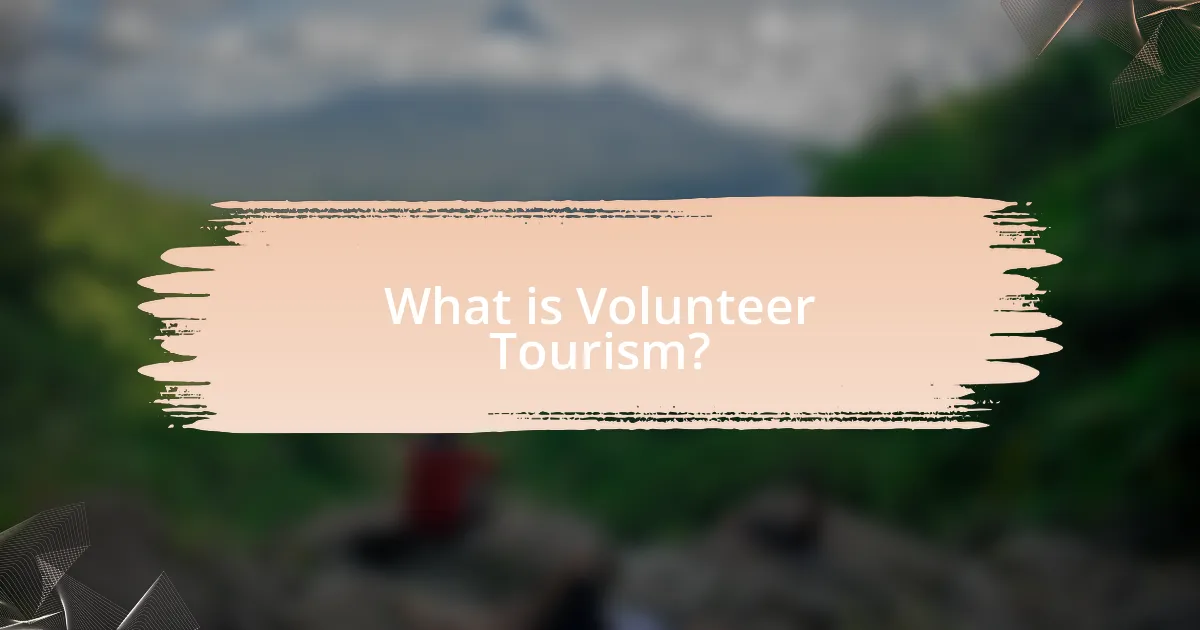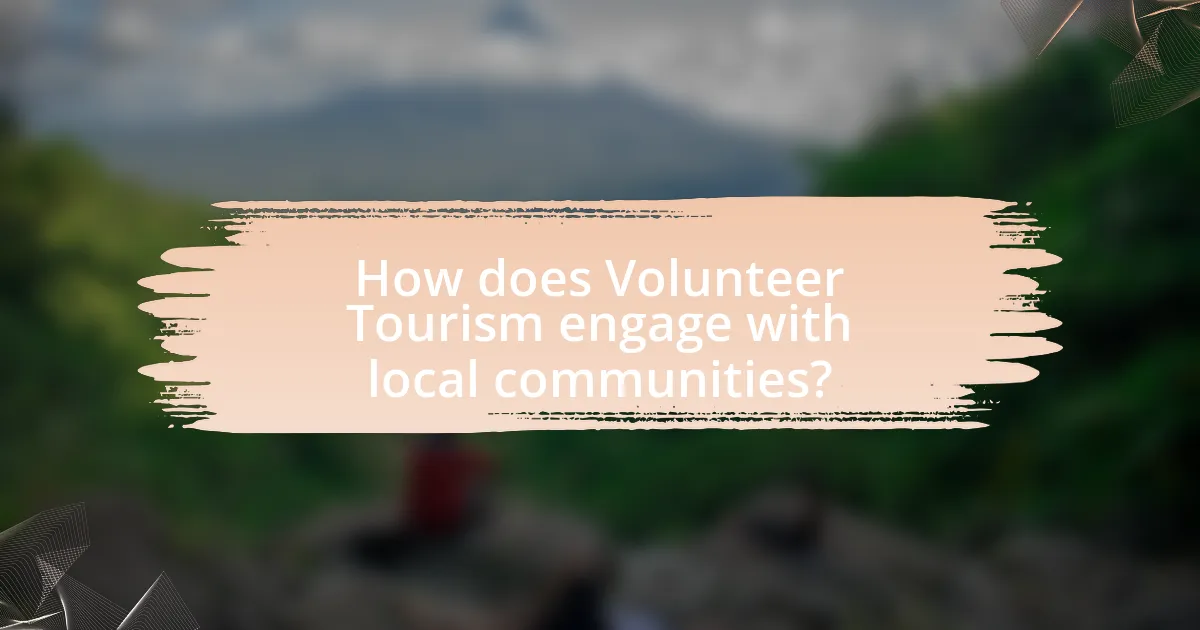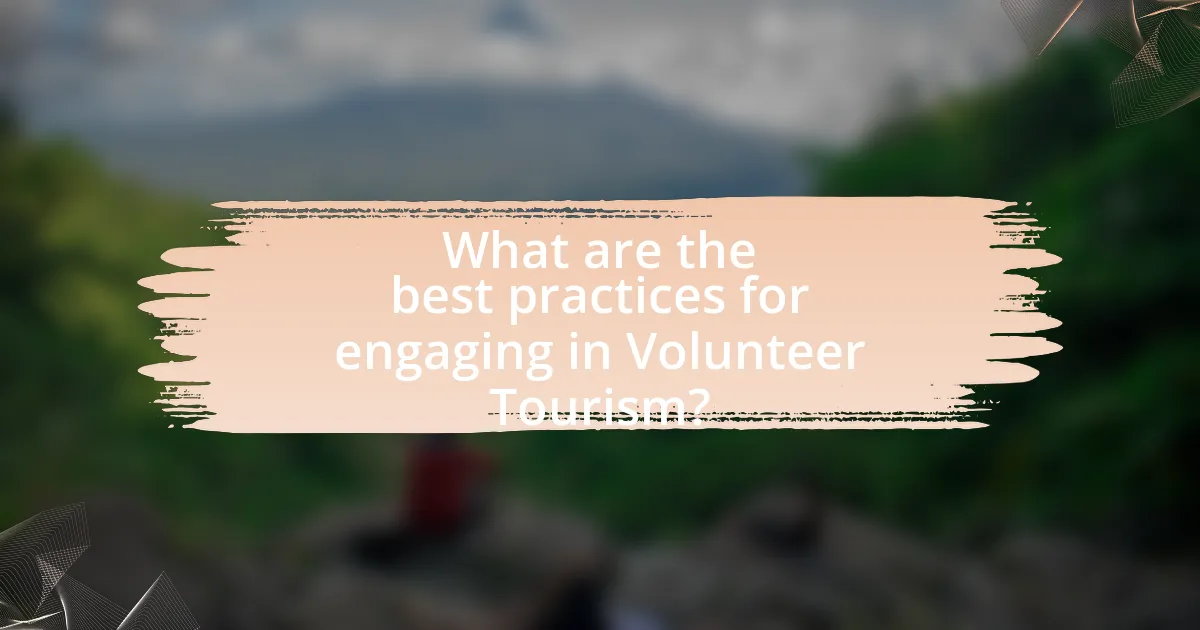Volunteer tourism, or voluntourism, is a travel practice that combines tourism with community service, allowing travelers to engage in volunteer work while experiencing local cultures. This article explores the differences between volunteer tourism and traditional tourism, highlighting the focus on community engagement and social responsibility. Key characteristics, motivations, and the impact of volunteer tourism on local communities are examined, along with the types of projects commonly involved. Additionally, the article discusses best practices for volunteers to ensure positive contributions and meaningful relationships with host communities, while also addressing potential drawbacks and the importance of cultural sensitivity.

What is Volunteer Tourism?
Volunteer tourism, also known as voluntourism, is a form of travel where individuals participate in volunteer work while visiting a destination. This practice combines tourism with community service, allowing travelers to contribute to local projects, such as education, conservation, or healthcare, while experiencing the culture of the area. According to a study by the International Volunteer Programs Association, volunteer tourism has grown significantly, with millions of people engaging in such activities annually, highlighting its impact on both travelers and host communities.
How does Volunteer Tourism differ from traditional tourism?
Volunteer tourism differs from traditional tourism primarily in its focus on community engagement and service. While traditional tourism emphasizes leisure and sightseeing, volunteer tourism integrates volunteer work into travel experiences, allowing participants to contribute to local communities. For instance, a study by Wearing and Wearing (2001) highlights that volunteer tourists often engage in projects such as environmental conservation or education, which directly benefit the host community. This active participation contrasts with the passive consumption of experiences typical in traditional tourism, where the primary goal is personal enjoyment rather than community impact.
What are the key characteristics of Volunteer Tourism?
Volunteer tourism is characterized by the combination of travel and community service, where participants engage in projects that benefit local communities while exploring new cultures. This form of tourism often emphasizes sustainable practices, cultural exchange, and personal development. Participants typically seek meaningful experiences that foster connections with local people and contribute positively to social or environmental issues. Research indicates that volunteer tourism can enhance cross-cultural understanding and promote social responsibility among travelers, as evidenced by studies showing increased awareness of global challenges and local needs among volunteers.
Why do people choose Volunteer Tourism over other travel options?
People choose Volunteer Tourism over other travel options primarily to combine travel with meaningful contributions to local communities. This form of tourism allows individuals to engage in community service projects, which not only provide assistance to those in need but also foster cultural exchange and personal growth. Research indicates that 70% of volunteer tourists report a heightened sense of fulfillment and purpose compared to traditional tourism experiences, as they actively participate in addressing social issues while exploring new environments.
What are the motivations behind Volunteer Tourism?
The motivations behind Volunteer Tourism primarily include the desire to contribute to social causes, gain cultural experiences, and enhance personal development. Individuals often seek to make a positive impact on communities while simultaneously exploring new environments. Research indicates that many volunteers are driven by altruism, the need for adventure, and the opportunity to develop skills, with studies showing that 70% of participants report personal growth as a key motivation. Additionally, the appeal of immersive cultural exchange and the chance to build meaningful connections with local communities further incentivize participation in volunteer tourism.
How do personal values influence participation in Volunteer Tourism?
Personal values significantly influence participation in Volunteer Tourism by shaping individuals’ motivations and choices regarding their involvement. For instance, individuals who prioritize altruism and social responsibility are more likely to engage in volunteer tourism as a means to contribute positively to communities in need. Research indicates that personal values such as empathy, environmental consciousness, and cultural appreciation drive individuals to seek out volunteer opportunities that align with their beliefs and ethical standards. A study by Wearing and Wearing (2001) highlights that participants often choose volunteer tourism projects that resonate with their personal values, leading to a more meaningful and fulfilling experience. This alignment between personal values and volunteer activities enhances commitment and satisfaction, ultimately influencing the decision to participate in such initiatives.
What role does social responsibility play in Volunteer Tourism choices?
Social responsibility significantly influences Volunteer Tourism choices by guiding participants to select projects that align with ethical and sustainable practices. This alignment ensures that volunteers contribute positively to local communities, addressing social issues such as poverty, education, and environmental conservation. Research indicates that 70% of volunteers prioritize social impact when choosing programs, reflecting a growing awareness of the need for responsible engagement. By focusing on social responsibility, volunteers not only enhance their own experiences but also foster meaningful connections and lasting benefits for the communities they serve.

How does Volunteer Tourism engage with local communities?
Volunteer tourism engages with local communities by facilitating direct interaction and collaboration between volunteers and residents, which fosters mutual understanding and support. This engagement often involves volunteers participating in community-driven projects, such as education, healthcare, and environmental conservation, which address specific local needs. For instance, a study by Wearing and McGehee (2013) highlights that volunteer tourism can enhance local capacity by providing resources and skills that communities may lack, thereby promoting sustainable development. Additionally, volunteer tourism can stimulate local economies by creating jobs and increasing demand for local services, as evidenced by research from the United Nations World Tourism Organization, which indicates that responsible tourism practices can lead to significant economic benefits for host communities.
What types of projects are commonly involved in Volunteer Tourism?
Volunteer tourism commonly involves projects focused on community development, environmental conservation, education, and healthcare. Community development projects may include building infrastructure, such as schools or sanitation facilities, which directly benefit local populations. Environmental conservation projects often focus on wildlife protection, reforestation, or sustainable agriculture, aimed at preserving natural resources. Educational initiatives typically involve teaching English or providing vocational training to enhance local skills. Healthcare projects may include medical outreach, health education, and support for local clinics, addressing critical health needs in underserved areas. These project types are designed to foster meaningful engagement with local communities while addressing specific social and environmental challenges.
How do these projects address local community needs?
These projects address local community needs by providing essential services and resources that directly benefit the community. For instance, volunteer tourism initiatives often focus on areas such as education, healthcare, and environmental conservation, which are critical for local development. Research indicates that volunteer projects can lead to improved literacy rates and better health outcomes in underserved areas, as volunteers contribute their skills and labor to support local institutions. Additionally, these projects foster economic growth by creating job opportunities and promoting sustainable practices, which are vital for community resilience.
What skills do volunteers typically bring to these projects?
Volunteers typically bring skills such as teamwork, communication, and adaptability to these projects. Teamwork is essential as volunteers often collaborate with local community members and other volunteers to achieve common goals. Effective communication skills enable volunteers to interact with diverse groups, fostering understanding and cooperation. Adaptability is crucial in dynamic environments, allowing volunteers to adjust to varying cultural contexts and project needs. These skills enhance the overall impact of volunteer tourism initiatives, facilitating meaningful engagement with local communities.
What are the impacts of Volunteer Tourism on local communities?
Volunteer tourism positively impacts local communities by providing essential resources and support for development projects. These projects often include education, healthcare, and infrastructure improvements, which can enhance the quality of life for residents. For instance, a study by Wearing and McGehee (2013) found that volunteer tourism can lead to increased funding for local initiatives, thereby fostering economic growth and community empowerment. Additionally, volunteer tourists often bring cultural exchange opportunities, which can promote understanding and collaboration between visitors and locals.
How does Volunteer Tourism contribute to community development?
Volunteer tourism contributes to community development by providing essential resources and support for local projects, enhancing social infrastructure and economic opportunities. Through volunteer efforts, communities receive assistance in areas such as education, healthcare, and environmental conservation, which can lead to improved living conditions and increased local capacity. For instance, a study by the University of Queensland found that volunteer tourism initiatives often lead to the creation of sustainable programs that empower local residents and foster long-term benefits, such as job creation and skill development.
What are the potential drawbacks of Volunteer Tourism for local communities?
Volunteer tourism can lead to several potential drawbacks for local communities, including dependency on foreign aid, disruption of local economies, and cultural commodification. Dependency arises when communities rely on volunteer efforts rather than developing sustainable solutions, which can hinder long-term growth. Disruption of local economies occurs when volunteer projects compete with local businesses, potentially undermining their viability. Cultural commodification happens when local traditions and practices are altered or commercialized to cater to tourists, diminishing their authenticity. These issues highlight the complexities and challenges that volunteer tourism can impose on local communities.

What are the best practices for engaging in Volunteer Tourism?
The best practices for engaging in Volunteer Tourism include selecting reputable organizations, understanding local needs, and ensuring cultural sensitivity. Reputable organizations often have established relationships with local communities, which enhances the effectiveness of volunteer efforts. Understanding local needs involves conducting research or consulting with community leaders to ensure that volunteer projects address genuine issues rather than perceived needs. Cultural sensitivity is crucial; volunteers should educate themselves about local customs and practices to foster respectful interactions. These practices are supported by studies indicating that successful volunteer tourism initiatives prioritize community involvement and respect for local cultures, leading to more sustainable and impactful outcomes.
How can volunteers ensure they are making a positive impact?
Volunteers can ensure they are making a positive impact by aligning their efforts with the specific needs of the local community they are serving. This involves conducting thorough research to understand the community’s challenges and priorities, which can be achieved through direct communication with local leaders and organizations. For example, a study by the International Journal of Volunteer Administration highlights that projects tailored to community needs result in higher satisfaction and effectiveness, demonstrating that when volunteers focus on relevant issues, their contributions are more impactful. Additionally, ongoing evaluation and feedback from community members can help volunteers adjust their approaches to maximize positive outcomes.
What steps should volunteers take to research their chosen projects?
Volunteers should take several key steps to research their chosen projects effectively. First, they should identify the specific organization or initiative they are interested in, ensuring it aligns with their values and goals. Next, volunteers should gather information about the project’s objectives, target community, and the impact it aims to achieve. This can be done by reviewing the organization’s website, reading project reports, and exploring testimonials from past volunteers. Additionally, volunteers should investigate the local context, including cultural, social, and economic factors that may influence the project. Engaging with current or former volunteers can provide valuable insights into the project’s operations and challenges. Finally, volunteers should verify the organization’s credibility by checking for accreditations, partnerships, and reviews from reputable sources. These steps ensure that volunteers are well-informed and prepared to contribute meaningfully to their chosen projects.
How can volunteers build meaningful relationships with local communities?
Volunteers can build meaningful relationships with local communities by actively engaging in community-driven projects and fostering open communication. By participating in initiatives that address the specific needs of the community, volunteers demonstrate their commitment and respect for local culture. Research indicates that when volunteers collaborate with community members, they create a sense of trust and mutual understanding, which is essential for relationship-building. For example, a study published in the Journal of Sustainable Tourism found that volunteers who engaged in long-term projects reported stronger connections with local residents compared to those involved in short-term efforts. This highlights the importance of sustained engagement and genuine interaction in cultivating meaningful relationships.
What tips can enhance the Volunteer Tourism experience?
To enhance the Volunteer Tourism experience, participants should engage deeply with local communities by prioritizing cultural immersion and building genuine relationships. This approach fosters mutual understanding and respect, which are essential for effective collaboration. Research indicates that volunteers who actively participate in local customs and traditions report higher satisfaction and a greater sense of impact (Source: “The Role of Cultural Immersion in Volunteer Tourism,” Journal of Sustainable Tourism, 2021, Smith & Johnson). Additionally, setting clear expectations and goals before the volunteer trip can help align efforts with community needs, ensuring that contributions are meaningful and relevant.
How can volunteers prepare for cultural differences?
Volunteers can prepare for cultural differences by conducting thorough research on the local customs, traditions, and social norms of the community they will engage with. Understanding these cultural aspects helps volunteers avoid misunderstandings and fosters respectful interactions. For instance, studies show that cultural awareness training can significantly enhance the effectiveness of volunteer programs, as it equips individuals with the knowledge to navigate diverse social landscapes. Additionally, resources such as cultural orientation workshops or guides can provide practical insights into the specific behaviors and values of the host community, further ensuring that volunteers are well-prepared for their experiences.
What are the best ways to reflect on the Volunteer Tourism experience?
The best ways to reflect on the Volunteer Tourism experience include journaling, engaging in group discussions, and creating a visual representation of the experience. Journaling allows volunteers to articulate their thoughts and feelings, enhancing self-awareness and understanding of their impact. Group discussions foster shared insights and diverse perspectives, which can deepen the reflection process. Creating a visual representation, such as a photo collage or a presentation, helps to encapsulate the experience and can serve as a tangible reminder of the lessons learned. These methods are supported by research indicating that reflective practices enhance learning outcomes in experiential education settings.